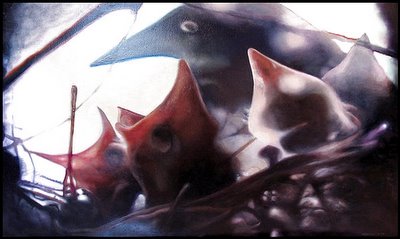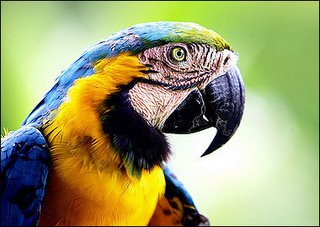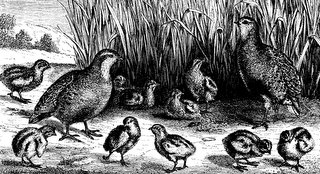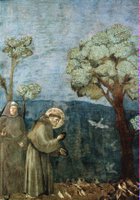Their song was: Regnum mundi
When the time approached that God had ordained, that she which had despised the reign mortal should have the reign of angels, she lay sick of the fevers and turned her to the wall, and they that were there heard her put out a sweet melody; and when one of the chamberers had enquired of her what it was, she answered and said: A bird came between me and the wall and sang so sweetly that it provoked me to sing with it. She was always in her malady glad and jocund, and ne ceased of prayer. The last day tofore her departing, she said to her chamberers: What will ye do if the devil come to you? And after a little while she cried with a high voice: Flee ! flee! flee ! like as she had chased away the devil, and after, she said: The midnight approacheth in which Jesu Christ was born; it is now time that God call his friends to his heavenly weddings. And thus, the year of our Lord twelve hundred and thirty-one, she gave up her spirit and slept in our Lord, and though the body lay four days unburied, yet came there no stench from it, but a sweet odour aromatic came, which refreshed all them that were there. Then there was heard and seen a multitude of birds, so many that there hath not been seen the like tofore, over the church, and began a song of right great melody, like as it had been the obsequies of her, and their song was: Regnum mundi, which is sung in the praising of virgins. There was a great cry of poor people for her and much devotion of people, so that some took a hair of her head, and some a part of her clothes, which they kept for great relics. And then her body was put in a monument, which after was found to redound in oil, and many fair miracles were showed at her tomb after her death.
It was well showed in the dying of S. Elizabeth of what holiness she was, as well in the modulation of the bird as in the expulsion of the devil. That bird that was between her and the wall, and provoked her to sing, is supposed to be her good angel, which was deputed to her, and brought her tidings that she should go to the everlasting joy, and in like wise is showed to cursed men otherwhile their everlasting damnation.
St Elizabeth of Hungary died on November 17, 1231 at twenty-four years old, having lived a heroic life for God. She is said to have noticed birds throughout her life, especially the storks and swallows of rooftops and chimneys. Before her death a bird, one the Golden Legend account above supposes to be her guardian angel, visited her. Here is similar account:
At the end of two years she was attacked by a violent fever, and, much against her will, was forced to take to her bed. For ten or twelve days she lingered, cheerful and happy, but always in prayer. One evening towards sunset she fell asleep, when her maid, who was sitting with her, was startled by hearing a beautiful song proceeding from the pillow.
"Oh, madam, what lovely music!" cried the girl.
"Did you hear it too?" asked Elizabeth. "A charming little bird came and sat between me and the wall, and he sung so sweetly that he filled my soul with joy, and I could not help singing also! He told me besides," she added, after a pause, "that I shall die in three days."
And in three days she was dead as she had foretold, and was buried, as she wished, in the chapel of the hospital.
Today, if it please you Lord, let the birds sing Regnum mundi.
R. Regnum mundi et omnem ornátum sæculi contempsi, propter amórem Dómini mei Jesu Christi : * Quem vidi, quem amávi, in quem credidi, quem diléxi, allelúja.
V. Eructávit cor meum verbum bonum : dico ego ópera mea Regi.
R. Quem vidi, quem amávi, in quem credidi, quem diléxi, allelúja.
V. Glória Patri, et Fílio, et Spirítui Sancto.R. Quem vidi, quem amávi, in quem credidi, quem diléxi, allelúja.











